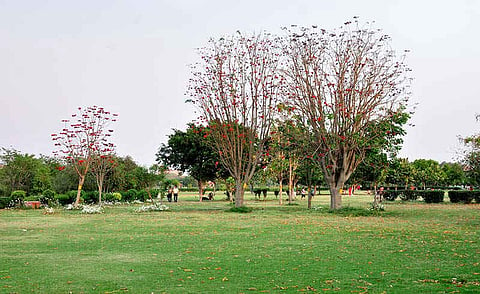Wastewater Reservoirs to Irrigate Parks in Delhi Planned
The Municipal Corporation of Delhi plans to set up a series of underground reservoirs to collect and supply wastewater to irrigate parks, in an effort to reduce its dependence on groundwater, officials aware of the matter said on Sunday.
A senior municipal official from the horticulture department said that surveys of large parks in Keshavpuram and Rohini zones are being carried out to identify potential sites for these underground reservoirs.
“At least three such reservoirs will be set up in Rohini zone while four locations have been identified in Keshavpuram zone, to feed a network of around 563 parks. We will feed these reservoirs using treated wastewater from Delhi Jal Board sewage treatment plants (STP) in the region. These underground reservoirs will act as primary nodes from where treated water will be pumped to smaller parks in the region. The project will then be replicated in other zones,” an official said, requesting anonymity.
MCD covers an area of 1397.3 sq km which is sub-divided into 12 Zones — Centre, South, West, Najafgarh, Rohini, Civil Lines, Karol Bagh, SP City, Keshavpuram, Narela, Shahdara North and Shahdara South.
The horticulture department oversees 15,226 parks spread over an area of 5,172 acres. Around 1,022 parks are above the one-acre category while the rest are smaller parks.
Under the long-term project report to replace irrigation water with treated wastewater, the corporation plans to target 11,869 parks which currently consume 9.92 million gallons per day. “This will help in closing around 3,339 tubewells and the estimated expenditure is ₹291.76 crore,” the MCD report on action plan on reuse of treated water said.
The corporation already operates 32 smaller STPs which are being used to irrigate around 3% of the park areas under the corporation.
“One hundred and fifty parks in Vasant Kunj are being irrigated using the treatment plant in the area which produces 480 KLD (kiloliters per day) of water and a 430 KLD plant in Okhla is being used to feed 103 parks spread over 43 acre while treatment plants in hotels are also being put to use in the parks located in nearby areas. The establishments under this project include Hotel Jaypee Vasant Kunj, Hyatt Regency, and Select City Walk,” the report adds.
While DJB produces around 530 million gallons of treated wastewater every day, the utilisation of this is as low as 89 MGD, the economic survey of Delhi 2023 underlined. This water is being supplied to places like the Delhi Development Authority (DDA) Golf Course in Bhalswa, Sanjay Van, Garden of Five Senses and to wash vehicles in the Narela area.
In February 2021, the National Green Tribunal directed the DJB to ensure the supply of treated water with adequate pressure in public parks and to stop groundwater extraction for gardening.
The tribunal had earlier prohibited DDA, MCD, and DJB from using freshwater for gardening purposes.
An MCD official said that no progress has been made by DJB in setting up the pipeline network to supply water to the parks and the civic body is now forced to take steps to implement this project.
However, experts said that while the project save groundwater from depleting, it needs to be ensured that the treated water meets the parameters.
Diwan Singh, environmental activist who led the Yamuna Satyagrah to rejuvenate the river and other water bodies in the city, said that there were no in prinin-principleions to using treated water for horticulture purpose as there was negwereible chances of groundwater contamination. “It helps save precious groundwater aquifers as well but the authorities must ensure that the treated water from STPs meets the biochemical oxygen demand and total suspended solid parameters and it does not stink. Often we have found that the parameters are not being met,” he said.

